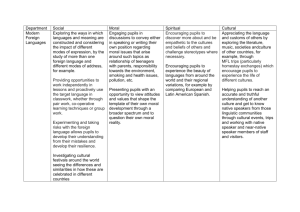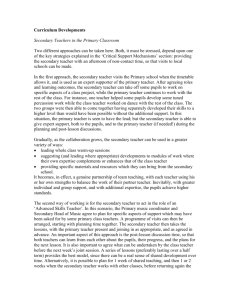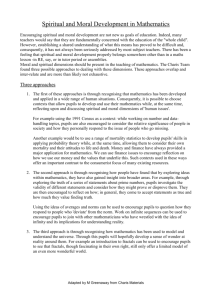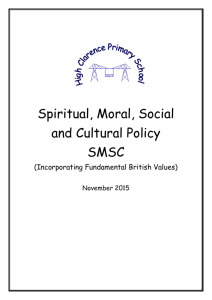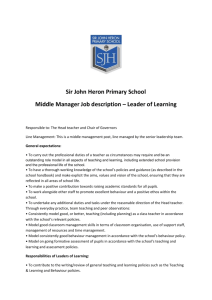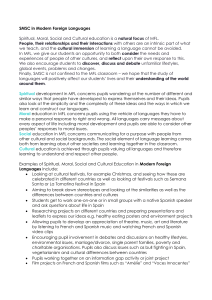SMSC Policy 2015 - William Fletcher Primary School
advertisement
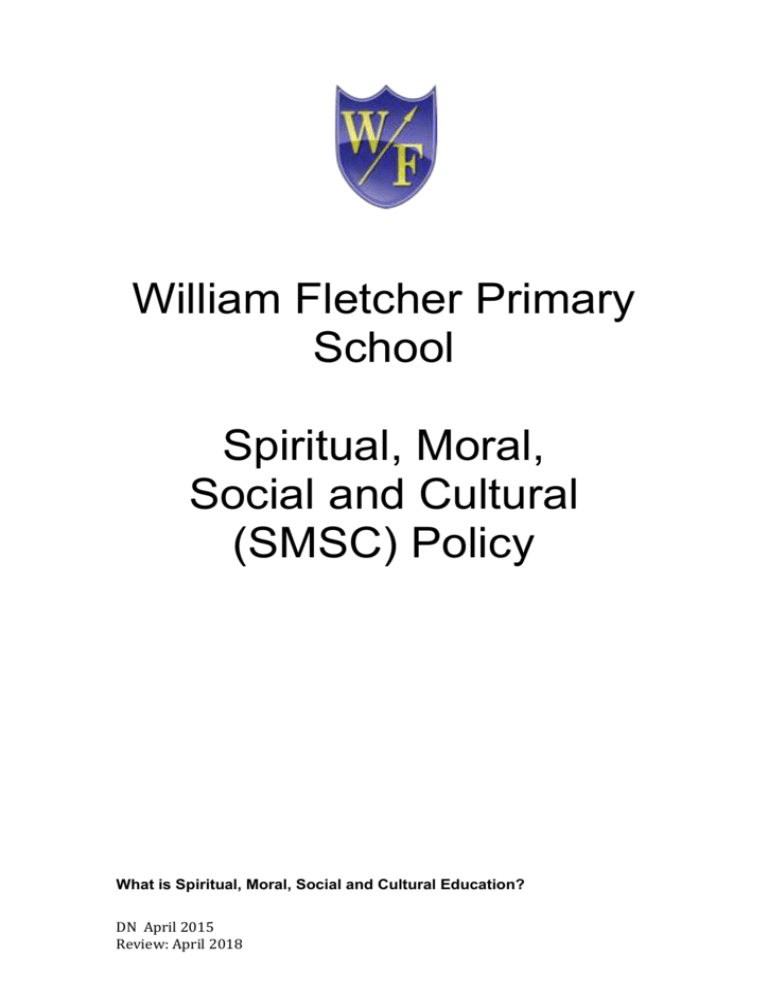
William Fletcher Primary School Spiritual, Moral, Social and Cultural (SMSC) Policy What is Spiritual, Moral, Social and Cultural Education? DN April 2015 Review: April 2018 The Spiritual Development of children is shown by their: ability to be reflective about their own beliefs, religious or otherwise, which inform their perspective on life and their interest in and respect for different people’s feelings, values and faiths. sense of enjoyment and fascination in learning about themselves, others and the world around them, including the intangible use of imagination and creativity in their learning willingness to reflect on their experiences The Moral Development of children is shown by their: •ability to recognise the difference between right and wrong, and their readiness to apply this understanding in their own lives. To have a respect for the civil and criminal law of England •understanding of the consequences of their behaviour •interest in investigating, and offering reasoned views about, moral and ethical issues. Able to accept, respect and appreciate that others may have a different viewpoint. The Social Development of children is shown by their: •use of a range of social skills in different contexts, including working and socialising with pupils from different religious, ethnic and socio-economic backgrounds •willingness to participate in a variety of social settings, cooperating well with others and being able to resolve conflicts effectively •willingness to volunteer •interest in, and understanding of, the way communities and societies function at a variety of levels •acceptance and engagement with the fundamental British Values (see the school teaching British Values Policy statement) of democracy, the rule of law, respect and tolerance of those with differing faiths and beliefs. Their attitudes towards these British values allows the children to participate fully in and contribute positively to life in modern Britain. The Cultural Development of children is shown by their: •understanding and appreciation of the wide range of cultural influences that have shaped their own heritage and that of others •willingness to participate in, and respond to, for example, artistic, musical, sporting, mathematical, technological, scientific and cultural opportunities •understanding and appreciation of the wide range of different cultures within school and further afield as an essential element of their preparation for life in modern Britain •interest in exploring, understanding of, and respect for cultural diversity and the extent to which they understand, accept, respect and celebrate diversity, as shown by their attitudes towards different religious, ethnic and socio-economic groups in the local, national and global communities DN April 2015 Review: April 2018 Planning In planning lessons, teachers are aware of the need to plan opportunities to develop a wide variety of spiritual, moral, social and cultural needs. A vast majority will be delivered through cross-curricular activities as well as specific PSHE, RE and Circle Time activities. How we make provision for children’s Spiritual, Moral, Social and Cultural Development across the school Spiritual Development Provision How it is evidenced Religious Education curriculum RE curriculum plans, include a Assemblies multi-faith approach based upon the Opportunities for quiet reflection Oxfordshire SACRe document. Outdoor education Visiting places of worship Whole school Values based monthly Whole school assemblies and themes celebrations of values person of the week. Outdoor learning Forest School activities Residential visits Founders’ Day celebrations May Day Dancing Harvest, Christmas and Easter celebrations Nurture groups Visits from faith groups Time to reflect upon learning and experiences Planned opportunities for spiritual development in all subjects can be seen across the school. Children are given opportunities to reflect upon the meaning of spiritual experiences. Examples of experiences commonly regarded as spiritual include: • Curiosity and questions • Awe and wonder • Connection and belonging • Heightened self-awareness • Prayer and worship • Deep feelings of what is felt to be ultimately important • A sense of security, well-being, worth and purposefulness The school has developed a climate within which all children can grow and flourish, respect others and be respected; accommodating difference and DN April 2015 Review: April 2018 respecting the integrity of individuals. Moral Development Provision How it is evidenced School behaviour Policy and Code of Regular reviews of Behaviour Conduct Nurture groups Celebration of children achieving Religious Education curriculum the Gold Cloud in class Anti-bullying activities and AntiPupil Voice bullying Ambassadors E-Safety teaching Philosophy for Children Whole school Assemblies and the explicit discussion of school values, Taking part in Charitable projects value of the month communicated to parents and carers through newsletter Weekly school Values certificates to children in assembly and published in school newsletter Circle times Child participation in a range of pupil groups: School Council, Sports Crew, BLP team, Eco Committee and anti-bullying ambassadors Charity appeals Singing at Yarnton Nursing home and Pensioner’s Lunch Club We support children to: Distinguish right from wrong, based on knowledge of the moral codes of their own and other cultures Develop an ability to think through the consequences of their own and others’ actions Have an ability to make responsible and reasoned judgements Ensure a commitment to personal values Have respect for others’ needs, interests and feelings, as well as their own Develop a desire to explore their own and others’ views, and an understanding of the need to review and re-assess their values, codes and principles in the light of experience Our school develops pupil moral development by: Providing a clear moral code as a basis for behaviour which is promoted consistently through all aspects of the school Promoting racial, religious and other forms of equality Giving pupils opportunities across the curriculum to explore and develop moral concepts and values –for example, personal rights and responsibilities, truth, justice, equality of opportunity, right and wrong Developing an open and safe learning environment in which pupils can DN April 2015 Review: April 2018 express their views and practice moral decision making Rewarding expressions of moral insights and good behaviour Recognising and respecting the codes and morals of the different cultures represented in the school and wider community Encouraging pupils to take responsibility for their actions, for example, respect for property, care of the environment, and developing codes of behaviour Providing models of moral virtue through literature, humanities, sciences, arts and assemblies; reinforcing the school’s values through images, posters, classroom displays, etc. and monitoring in simple ways, the success of what is provided Provision PSHE Curriculum Working together in teams Pupil Voice Extra curricular activities The Arts Curriculum Outdoor Education PE curriculum Cross phase working Social Development How it is evidenced Implementation of Family Links through class circle times Pupil Groups including: School Council, Anti-bullying ambassadors, BLP Team, Sports Crew, Eco Committee Residential visits in year and 6 Educational visits Afterschool clubs including: Spanish, football, Lego, chess, Change4life, choir African Drumming for year 4 and 6 Participation in Music events: Choristers’ Project, Lieder Festival Transition visits Play leaders Class Buddies Participation in Charity support: Charity enterprise project, Children in Need, Red Nose Day Participation in Sporting events School house sports competitions Forest School At William Fletcher Primary School we recognise that pupils who are becoming socially aware are likely to be developing the ability to: Adjust to a range of social contexts by appropriate and sensitive behaviour Relate well to other people’s social skills and personal qualities Work successfully, as a member of a group or team Share views and opinions with others Resolve conflicts maturely and appropriately Reflect on their own contribution to society Show respect for people, living things, property and the environment DN April 2015 Review: April 2018 Exercise responsibility Understand how societies function and are organised in structures such as the family, the school Understand the notion of interdependence in an increasingly complex society Our school develops pupil social development by: Identifying key values and principles on which school and community life is based Fostering a sense of community, with common, inclusive values Promoting racial, religious and other forms of equality Encouraging pupils to work co-operatively Encouraging pupils to recognise and respect social differences and similarities Providing positive experiences to reinforce our values as a school community –for example, through assemblies, team building activities, residential experiences, school productions Helping pupils develop personal qualities, which are valued in a civilised society, for example, thoughtfulness, honesty, respect for difference, moral principles, independence, interdependence, self-respect and awareness of others’ needs Providing opportunities for engaging in the democratic process and participating in community life Providing opportunities for pupils to exercise leadership and responsibility Providing positive and effective links with the world of work and the wider community Provision School Visits Participation in the Arts Arts Curriculum MFL DN April 2015 Review: April 2018 Cultural Development How it is evidenced School visits to museums, galleries, concerts, theatre visits Meeting authors Year 3 Arts awards project Partnership Dance workshops Opportunities to take part in school productions /Performances African Drumming for year 4 and 6 Brass Band for year 5 Singing teaching for year 3 and FS Opportunities for individual instrumental lessons Visits from people of different cultures MFL teaching Afterschool Spanish Club Sports Day Cultural Development Children learn about and experience the diversity of other cultures both within modern Britain and throughout the world. Children who are becoming culturally aware are likely to be developing some or all of the following characteristics: An ability to reflect on important questions of meaning and identity An interest in exploring the relationship between human beings and the environment Our school develops cultural development by: Extending pupils’ knowledge and use of cultural imagery and language Encouraging them to think about special events in life and how they are celebrated Recognising and nurturing particular gifts and talents; providing opportunities for pupils to participate in literature, drama, music, art, crafts and other cultural events and encouraging pupils to reflect on their significance Reinforcing the school’s cultural links through displays, posters, exhibitions, etc. As well as developing partnerships with outside agencies and individuals to extend pupils’ cultural awareness, for example, theatre, museum and gallery visits DN April 2015 Review: April 2018

